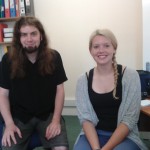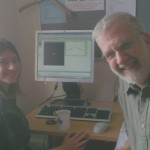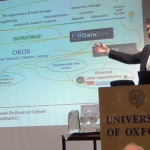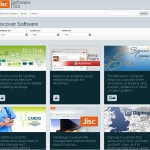- Mark Johnson and Rachel Holmshaw take a moment from their preparations for their trip to meet software developers in Southampton
- Maria Marinari and Ken Kahn with their ABM that they are using to explore how planets (and exo-planets) move around solar systems
- James A J Wilson presenting the pilot Oxford research data management infrastructure
- The Jisc Software Hub project developed a website showcasing Jisc-funded software.
- Screenshot of the Torch website
Highlights
This summer we had the pleasure of working with three outstanding interns:
- Rachel Holmshaw worked with the Jisc Software Hub team to make a range of videos that tell the story of a few successful open source software projects (that were funded or part-funded by JISC). Rachel made videos ranging from quick demos to on-location documentary style pieces that involved visiting researchers in Southampton and labs in Oxford.
- Maria Marinari came to us through the Nuffield Research Placements scheme (Ken and Howard are STEM ambassadors). Maria worked closely with Ken to build a model of our solar system using the Behaviour Composer, and then presented the model to researchers in the Physics department. Maria is sure to go far.
- Charlie Green joined the Jisc ORDS project and worked with David Paine and James Wilson to test the ORDS software. Impressively Charlie taught herself SQL and how to use the Selenium test system in the space of a few weeks, and then handed over some extremely useful work for the rest of the team to carry on with as we try to move the ORDS software from development to production.
James A J Wilson introduced and helped to organize the Damaro/Oxford DMPOnline Projects final workshop on the 28th June, which featured speakers from IT Services, the Bodleian Libraries, the OeRC, and external representation from the Engingering and Physical Sciences Research Council (EPSRC). The workshop considered the growing importance of research data management (RDM) and demonstrated the tools and services being developed at Oxford to help researchers meet the requirements of their funders. James ran a session on managing data from planning to re-use, looking at case studies from each of the four academic divisions, whilst Meriel ran a session on providing training and guidance for researchers. The workshop attracted around 60 delegates from 10 different universities.
Ken launched the ABM service’s first 8-week course via the ITLP programme. Between 4-10 people attended each session and one student built ABM into her Master’s project as a result (Geography department).
Howard supported Prof. Zeitlyn and colleagues at the University of York in writing a proposal to the AHRC videogames research networking funding call. If funded the team will have £45k to bring together researchers from across the University of Oxford and University of York, researchers from Yaounde University in Cameroon, professionals from the videogame industry, and researchers at the Serious Games Institute. The network will focus on narrative and narrativity in the context of making, playing and explaining videogames that relate to real life.
James Cummings directed another successful Digital Humanities Summer School attracting researchers from across Oxford, the UK and far beyond. The event received excellent feedback from and participants and from our own department – James and Lucy Cridland-Smith were given a special contribution award.
Plans for next 3-months
- James A J Wilson will lead an ambitious and demanding project to move the ORDS software that was developed with Jisc support into the emerging ‘live data’ RDM service our team aims to offer. James will work with Mark, David Paine, Meriel, Howard, Scott, Sebastian and colleagues in the libraries to (a) finish off the coding and user interface development of the ORDS system (Dec 2013) and hand over the hosting of the software to the Sysdev group (b) continue to work with RDM early adopters to further define the broader RDM service.
- With the ‘live data’ RDM service in mind, the whole team will be attending courses about relational databases, R, SPSS, NVivo and data visualisation with a mind to helping academics who want to use these types of tools with the RDM infrastructure. For instance, we are currently working on a problem that we believe is common across the University where a research group has a large and growing body of survey data that they want to pull into a single place to help them share and analyse it. We hope to help here by uploading data exported from survey tools to a database with a web interface, provide forms to add data manually (e.g. from paper copies of the survey), and provide SQL queries to help researchers download subsets of the survey data for analysis using for instance SPSS.
- Meriel will work with IT services web team to get feedback on the current service catalogue.
- James Cummings will start work on the DiXiT project.
- Mark, Howard and Meriel will finish off Oxford’s commitment to the Jisc Software Hub project and hopefully launch the site with Jisc and the software sustainability institute (Edinburgh Uni)
- Ken will work with the ITLP team to further promote ABM service and try to find new academics interested in using ABM in their research and teaching. Videos may well be a big part of this (we’ll take stock of what we’ve learned from Rachel) e.g. recording Ken giving lectures and making video demonstrations of how to use the Behaviour Composer
- Martin will manage the second phase of his work with the Humanities division to further develop and expand the Torch website. He will work with IT staff and academics to show them how they can make sure of the Drupal web site development environment.
- Howard will continue his work with the Anthropology department on the OUP John Fell OxGAME project. This will involve preparation for the second visit to Cameroon where the plan is to build ABMs with researchers, farmers and government officials in the Yaounde.
- Last but not least, we will carry on with the projects listed below.
Advice

How many times the Research Support team engaged with different groups across the University i.e. 1:1 meeting to give advice or a taught course.
Current projects
DiXiT
Description: DiXiT is an international network of high-profile institutions from the public and the private sector that are actively involved in the creation and publication of digital scholarly editions. DiXiT offers a coordinated training and research programme for early stage researchers and experienced researchers in the multi-disciplinary skills, technologies, theories, and methods of digital scholarly editing.
In Collaboration With: 12-15 institutions, see website.
Our Work: IT Services will be hosting an Experience Researcher for 20 months; Provide some TEI-related training; Host an Early Stage Researcher for 6 months.
Resources: DiXiT is a large Marie Curie ITN-funded bid for 2.3 Million Euros; our share is significantly less.
Current Status: As of 2013-08-19 we’re setting up project infrastructure and awaiting the kick-off meeting in 2013-10.
URL: http://dixit.uni-koeln.de/ See also http://blogs.it.ox.ac.uk/jamesc/projects/dixit/
OUP John Fell OxGAME
Description: This is a OUP John Fell supported project with the Anthropology department where IT services are helping Professor Zeitlyn build a simple god-game using the the Behaviour Composer. Prof. Zeitlyn wants to explore the potential of using god-games in field research, in particular, asking questions about the future.
In Collaboration With: Oxford Anthropology department, University of York centre for complex cystem analysis , Stockholm Environment Institute, and Yaounde 2 University/ Dschang University in Cameroon
Our Work: Design and develop a god-game/ABM to use with farmers in Somie village in central-north Cameroon
Resources: Ken, Howard and the Behaviour Composer
Current Status: The project is half way through, we’re about to start planning the second field trip with the Stockholm environment institute (we hope to share costs).
URL: http://blogs.it.ox.ac.uk/modelling4all/category/cameroon/
LEAP: The Livingstone Online Enrichment and Access Project
Description: LEAP is an NEH Humanities Collections and Reference Resources Grant to support ongoing enrichment of and access to Livingstone Online. This site — a well established, transatlantic, digital archive initiative — seeks to provide worldwide access to the writings of Dr. David Livingstone (1813-73), the Scottish abolitionist, missionary, and explorer of Africa. The Livingstone Online site is directed jointly by Adrian S. Wisnicki (University of Nebraska – Lincoln) and Christopher Lawrence (University College London). The archive is published by University College London and is associated with the NEH-funded Livingstone Spectral Imaging Project published by the UCLA Digital Library. The Livingstone Online Enrichment and Access Project (LEAP) will support updating, integrating, and providing access to these two sites and their the digital image and transcription collections in order to secure their long-term sustainability as a unified, open-access resource for scholars and the general public. Dr James Cummings of the Research Support Team, IT Services, University of Oxford is providing around a month’s worth TEI-related consultation and legacy data migration assistance to the project.
In collaboration with: Dr Adrian Wisnicki (University of Nebraska–Lincoln), and Livingstone Online
Our work: James Cummings will be providing consultation work relating to encoding texts in TEI P5 XML.
Resources: This project was funded by the NEH for $275,000 total – our work on it is only about 30 days.
Dates: This project is running from 2013-2016
Current Status: There is a skype meeting in early September 2013 as a kick-off
URLs:
Jisc Software Hub project
Description: Create a Drupal website for Jisc that (a) collates metadata about all the software Jisc has funded (b) a public website that showcases the best software Jisc has funded
In Collaboration With: Jisc, Software Sustainability Institute (Edinburgh University), Open Source Advisory Service
Our Work: Design and build the Drupal website, including writing content and making short films about software
Resources: The project funds a developer and PM at Oxford and metadata experts at the SSI
Current Status: We are two months away from handing the website to Jisc who will make a decision whether they want to build this into their own main website. There is still quite a bit of work to do regarding tidying the metadata and improving the content (including the videos being created by Rachel).
URL: coming soon.
Jisc-funded ORDS Uptake Project
Description: The Online Research Database Service (ORDS) Uptake project is funded by the University Modernisation Fund and is being run in parallel with the ORDS Maturity Project – an internally-funded project to develop the software to the point at which it can be launched as a service. The Uptake Project is ‘incentivizing’ early adoption of the ORDS at Oxford, working with three partner universities to better understand the scope for use beyond Oxford, and looking into the potential of offering the service via commercial providers at the national level.
Resources: James Wilson is leading this project with David Paine and Dominic Hargreaves. James will get support from our research support team.
Our work: Deliver the ORDS system so that it can be handed over to the IT services sysdev team early 2014. Work with eleven ‘early adopter’ research projects within Oxford. Define the service level description (using ITIL terminology).
In collaboration with: Three partner institutions – the Universities of Essex, Leicester, and St. Andrew’s.
Current status: We are now beginning the testing work, having recorded a demonstration video and issued instructions to our partners. A request for a no-cost project extension until the end of December has been made to JISC (due to the loss of development staff and illness).
Jisc-funded DaMaRO Project
This project is now finished!
The Data Management Roll-Out at Oxford (DaMaRO) Project officially concluded in June 2013. It was a JISC-funded project aimed at improving research data management (RDM) at the University of Oxford by integrating several existing and in-development tools and services into an institutional infrastructure supported by training and guidance and underpinned by an institutional research data management policy for the University. The project looked at the entire research data lifecycle, considering how the components of an institutional infrastructure could assist researchers meet their requirements at each stage of a research project, from planning to re-use.
The primary software output of the DaMaRO Project itself was the open source ‘DataFinder’ tool. DataFinder will act as a catalogue of research datasets produced at Oxford, with links to wherever the datasets described can be downloaded (or details of access restrictions if they are not publicly available). Other components of the Oxford RDM infrastructure consist of DataBank (the University’s putative data archive), the DataStage file management and deposit software, the Online Research Database Service, and the Oxford Data Management Planning Online tool. Major project outputs included the development and trialling of new and improved training and support materials, and new research looking at researcher attitudes, practices, and requirements across the spectrum of academic disciplines.
The major achievements over the last reporting period were the successful staging of the Damaro / Oxford RDMOnline end-of project workshop and the completion of the final report, which is currently undergoing a review by JISC before publication.




